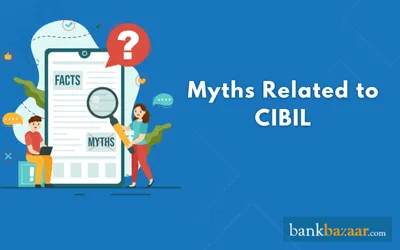Myths Related to CIBIL
Established in the year 2000 with the aim of ensuring sustainable credit growth in the country, CIBIL or the Credit Information Bureau of India Limited is a credit information company which maintains a record of individuals' loans and credit cards.
The information collated is used to generate Credit Information Reports (CIR) and credit scores which, by and large, are an indicator of individuals' abilities to repay loans and credit card payments.
CIBIL aims to bring in more transparency to the loan approval process in the country, in that customers now have an understanding of the seminal factors which lenders analyse to gauge creditworthiness. CIBIL reports, generated on a monthly basis (as mandated by the RBI), help lenders evaluate and approve or reject loan applications, as the case may be. However, there are several myths associated with CIBIL which need to be busted.
Some of the common myths associated with CIBIL are the following:

- CIBIL maintains a record of defaulters: Any customer who has opted for a loan or credit card will find details of his credit history with CIBIL but many wrongly believe that CIBIL has a record of defaulters. The truth is information about an individual's credit history is collated to help him make informed decisions and avail cheaper loans. It is, by and large, the prerogative of the bank or financial institution to evaluate the CIR and credit score on the basis of their credit policies.
- CIBIL is meant to support banks and financial institutions only: CIBIL reports and scores not only help banks make financially viable decisions but also enable customers maintain financial discipline and thereby increase their chances of loan approvals. CIBIL scores, therefore, make the process of loan approvals less opaque. Customers can avoid loan rejections owing to lack of a healthy credit history or missed payments since it reflects on their CIBIL score.
- CIBIL is fully authorized to make corrections in individuals' credit report: CIBIL is not authorized to make any changes to an individual's report unless approved by a bank or financial institution. CIBIL can, therefore, only help facilitate the process.
- Low CIBIL score = No loan or credit card for this lifetime:There are several lenders in the market with varying credit policies. Chances are that your loan application may be rejected by one and accepted by another. However, if you have a low credit score, you may have to bear the brunt of high interest rates and charges.
- Low CIBIL scores damage one's credit standing for keeps: A low CIBIL score is not set in stone. CIBIL scores will change as and when your credit history improves. Also, since banks and financial institutions request a CIBIL score only while evaluating an individual's loan application, they will have access to updated information.
- CIBIL scores are affected by assets/investments:
A CIR comprises details pertaining to loans and credit cards. It does not factor in a customer's investments, savings or current account. For instance, bounced cheques do not adversely impact one's credit score. However, a missed EMI or credit card payment will affect the credit card score. - CIBIL scores are the only determining factor for evaluating loan application: CIBIL score helps banks assess risks and as a result enhance operational efficiencies and lower costs. In addition to their underwriting policies, lenders take into account several factors such as the income of the borrower among many others.
- Applying for loans left, right and centre is bad for your credit score: Many believe that applying for loans from multiple lenders increases the likelihood of acquiring a loan. However, several lenders checking out your credit history adversely affects your CIBIL score as part of a 'hard' inquiry. It is, therefore, important to ensure that you do not apply for loans simultaneously from multiple lenders.
- Zero credit is ideal: Lenders typically look for responsible credit behaviour and regular payments rather than no credit or loans. A proven clean track record is the ideal scenario than no credit history at all.
CIBIL score is generic in that it can be used for several transactions such as home loans, credit cards, personal loans and car loans among others. CIBIL score can be used by banks during all stages of the credit lifecycle (approval, account management, collection and so forth).
CIBIL Related Articles
- How To Read Your Credit Report
- Correlation between Credit Rating and Debt
- CIBIL Marketplace
- Does Personal Loan and Credit Card Helps Credit Score?
- Credit Monitoring
- How your Credit Score is used
- Importance of good credit score
- Personal loan for cibil defaulters
- Low credit limit despite a high income?
- How Making Minimum Payments Can Affect Credit Score?
Disclaimer
Display of any trademarks, tradenames, logos and other subject matters of intellectual property belong to their respective intellectual property owners. Display of such IP along with the related product information does not imply BankBazaar's partnership with the owner of the Intellectual Property or issuer/manufacturer of such products.
CIBIL Score Requirements for Loans

Disclaimer
Credit Card:
Credit Score:
Personal Loan:
Home Loan:
Fixed Deposit:
Copyright © 2026 BankBazaar.com.
